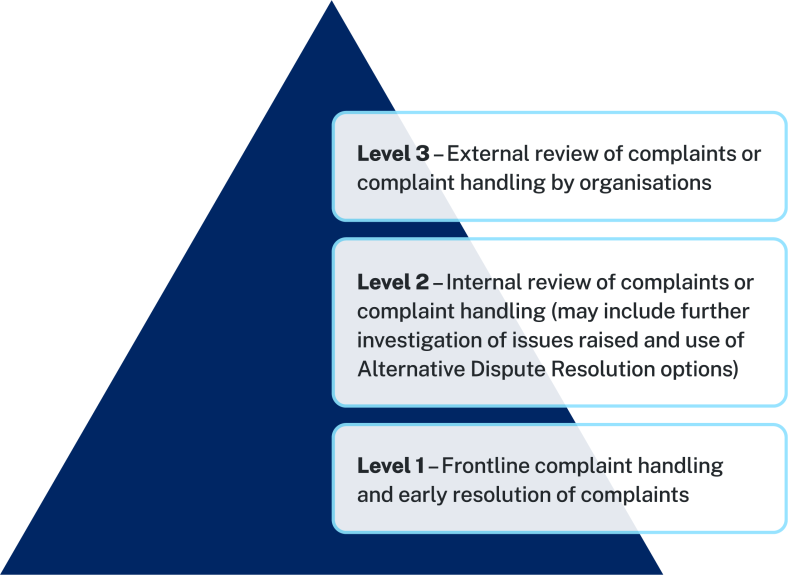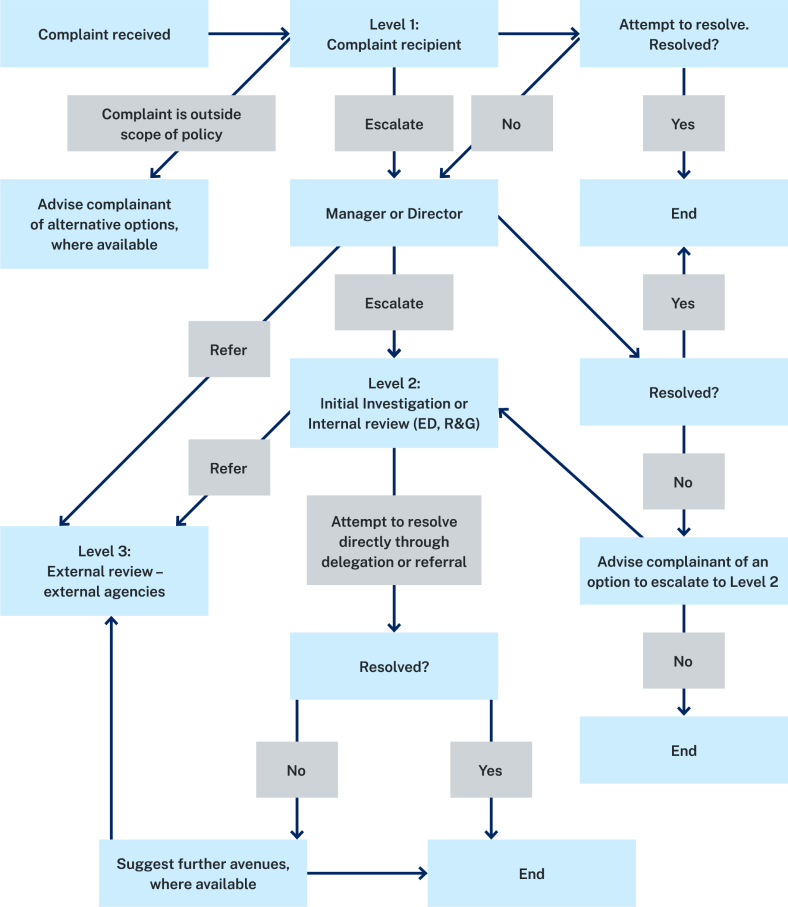Request accessible format of this publication.
Complaint management process
Introduction
The 3 levels of complaint handling are shown below and highlighted in the complaint handling process: detailed flowchart.

Complaint handling process: overview
NESA aim to resolve complaints at the first level, the frontline. Wherever possible staff will be adequately equipped to respond to complaints, including being given appropriate authority, training and supervision.
Where this is not possible, NESA may decide to escalate the complaint to a more senior officer in NESA. This second level of complaint handling will provide for the following internal mechanisms:
- assessment and possible investigation of the complaint and decision or decisions already made, and/or
- facilitated resolution (where a person not connected with the complaint reviews the matter and attempts to find an outcome acceptable to the relevant parties).
Where a person making a complaint is dissatisfied with the outcome of NESA’s review of their complaint, they may seek an internal review of the decision from NESA, or an external review of NESA's decision (by the Ombudsman for example).
Process
These are the six steps of the complaint management process that NESA will follow:

Complaint management process: six steps
Step 1: Receipt of complaint
Unless the complaint has been resolved at the outset, NESA will ask the person making the complaint to outline the complaint in writing, along with any supporting information. They can make a complaint.
The complaint related documents will be registered in NESA's TRIM records management system by the Complaints Manager (the Chief Financial Officer).
Step 2: Acknowledgement of complaint
NESA will acknowledge receipt of each complaint within five (5) working days. Consideration will be given to the most appropriate medium (such as email or letter) for communicating with the person making a complaint.
Step 3: Initial assessment and addressing of complaints
Initial assessment
After acknowledging receipt of the complaint, the Investigating Manager will confirm whether the issue or issues raised in the complaint are within NESA control. The Investigating Manager will also consider the outcome sought by the person making a complaint and, where there is more than one issue raised, determine whether each issue needs to be separately addressed.
When determining how a complaint will be managed, the Investigating Manager will consider:
- how serious, complicated or urgent the complaint is
- whether the complaint raises concerns about people’s health and safety
- how the person making the complaint is being affected
- the risks involved if resolution of the complaint is delayed, and
- whether a resolution requires the involvement of other organisations.
Addressing complaints
After assessing the complaint, the Investigating Manager will consider how to manage it. They may:
- provide the person making a complaint information or an explanation
- gather information from the product, person or area that the complaint is about, or
- investigate the claims made in the complaint.
NESA aim to resolve the complaint within 20 working days. NESA will keep the person making the complaint up to date on the progress, particularly if there are any delays. NESA will also communicate the outcome of the complaint using the most appropriate medium. Which actions NESA decide to take will be tailored to each case and take into account any statutory requirements.
Step 4: Providing reasons for decisions and alternative avenues for dealing with complaints
Following consideration of the complaint and any investigation into the issues raised, the Investigating Manager will contact the person making the complaint and advise them:
- the outcome of the complaint and any action we took
- the reason or reasons for NESA's decision
- the remedy or resolution that NESA have proposed or put in place.
If in the course of investigation, NESA makes any adverse findings about a particular individual, NESA will consider any applicable privacy obligations under the Privacy and Personal Information Protection Act 1998 (PPIP Act) and any applicable exemptions in or made pursuant to that Act, before sharing NESA's findings with the person making the complaint.
NESA will inform people who make complaints to or about NESA about any internal or external review options available to them (including any relevant Ombudsman or oversight bodies).
Step 5: Redress and closing the complaint
The Complaints Manager will keep comprehensive records about:
- how the complaint was managed
- the outcome of the complaint (including whether it or any aspect of it was substantiated, any recommendations made to address problems identified and any decisions made on those recommendations, and
- any outstanding actions that need to be followed up.
Step 6: Monitor and review
The relevant Executive Director will ensure that outcomes are properly implemented, monitored and reported to the Chief Financial Officer.
Accountability and learning
Analysis and evaluation of complaints
NESA will ensure that complaints are recorded in a systematic way so that information can be easily retrieved for reporting and analysis. Regular reports will be run on:
- the number of complaints received
- the outcome of complaints, including matters resolved at the frontline
- issues arising from complaints
- systemic issues identified
- the number of requests NESA receive for internal or external review of complaint handling.
Regular analysis of these reports will be undertaken to monitor trends, measure the quality of NESA customer service and make improvements. Both reports and their analysis will be provided to the NESA CEO and senior management for review.
Monitoring of the complaint management system
NESA will continually monitor its complaint management system to:
- ensure its effectiveness in responding to and resolving complaints, and
- identify and correct deficiencies in the operation of the system.
Monitoring may include the use of audits, complaint satisfaction surveys and online listening tools and alerts.
Continuous improvement
NESA is committed to improving the effectiveness and efficiency of the complaint management system. NESA will:
- support the making and appropriate resolution of complaints
- implement best practices in complaint handling
- recognise and reward exemplary complaint handling by staff
- regularly review the complaints management system and complaint data
- implement appropriate system changes arising out of our analysis of complaints data and continual monitoring of the system.
Complaint handling process: detailed flowchart
A detailed diagram of the complaint handling process that shows how complaints are resolved or will be escalated to more senior managers or external agencies until they are resolved.

Complaint handling process: detailed flowchart
More information
Useful contacts
Find contact information for external agencies that may be helpful to you:
- email: nswombo@ombo.nsw.gov.au
- call: 9286 1000
- call toll free (outside Sydney metro): 1800 451 524
- TTY: 9264 8050
Administrative Decisions Tribunal
- email: ag_adt@agd.nsw.gov.au
- call: 9377 5711
- fax: 9377 5723
- TTY: 9377 5859
Anti-discrimination New South Wales
- email: complaintsadb@justice.nsw.gov.au
- call: 1800 670 812
Information and Privacy Commission NSW
- email: ipcinfo@ipc.nsw.gov.au
- call: 1800 472 679
Independent Commission Against Corruption
- email: icac@icac.nsw.gov.au
- call: 8281 5999
Other related policies and procedures
All NSW government staff must understand and comply with the obligation to behave ethically, in ways that are consistent with the government sector core values. For more information read Behaving Ethically: A guide for NSW government sector employees.